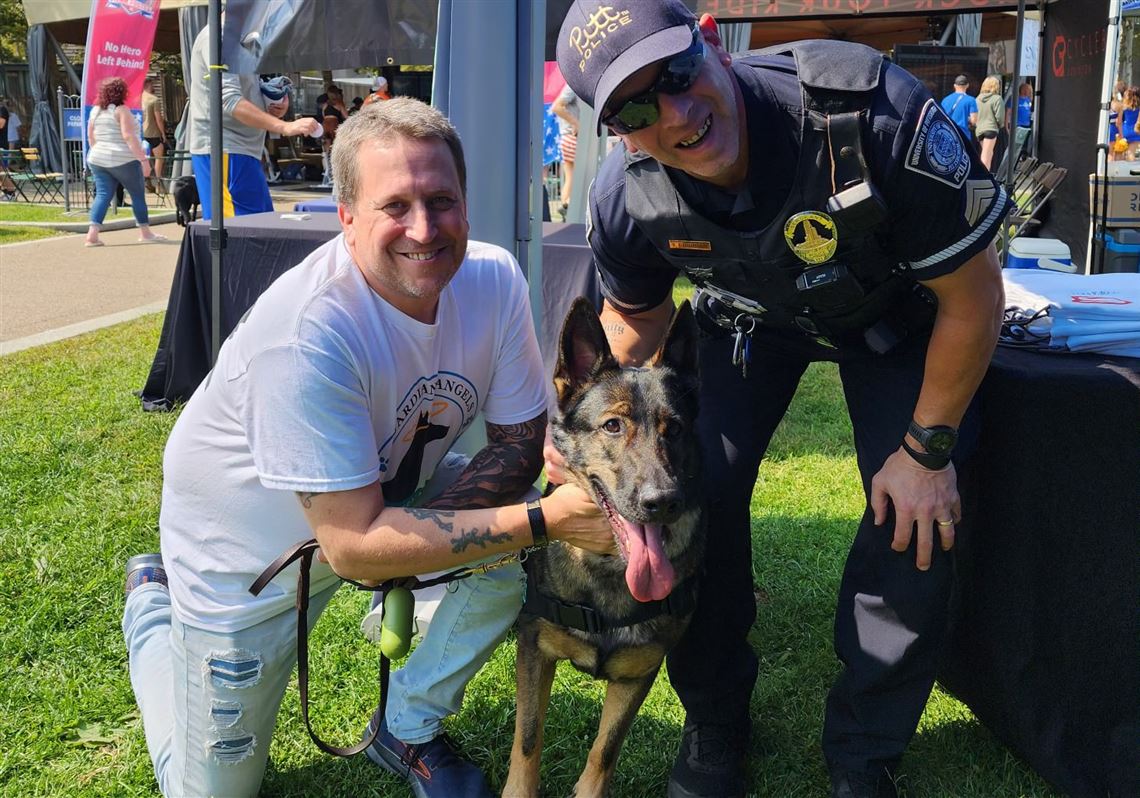Note: This article includes a reference to a suicide attempt.
Human-to-human interaction isn't the only solution to treat PTSD. For some people, service dogs can help. On a recent sunny Saturday afternoon near the Schenley Park carousel in Oakland, Ruff Ride, sponsored by the nonprofit Team Foster, hosted a 24-hour spin relay to raise money to provide service dogs to veterans with disabilities and with PTSD. University of Pittsburgh and Duquesne University students formed teams, some with as many as 50 members, to switch off every hour on the bike.
Team Foster was founded by Nick Liermann, an Army veteran and Pitt alumnus, to honor his friend Capt. Erick Foster, a Pittsburgh native who was killed in 2007 on his second deployment in Iraq. "I wanted to capture his legacy of pushing himself but also taking care of the team," said Liermann.
Service dogs can be trained for a variety of conditions and can help with PTSD, but one dog can cost up to $25,000 and take two years to train. Team Foster funds that cost for veterans.
Sheldon Ewers, 50, who lives in Jackson, Mich., came out to Ruff Ride in support of the cause after his own experiences with PTSD. A Navy veteran who served in the Gulf War, Ewers thanks his service dog for his life.
He was deployed in the Philippines during the 1991 eruption of Mount Pinatubo, which blanketed the land with ash. Typhoon Yunya coincided with the eruption and created a deadly and destructive effect that Ewers said was "like falling concrete." He remembers body bags; in smaller villages, bodies could be found under piles of volcanic ash.
After a few more years in the military and 13 years working at the Michigan Department of Corrections, he couldn't even go get groceries after work. On the rare occasions he did go out to restaurants, he'd plot the exit route, taking note of windows and doors and positioning himself accordingly. He was paired with his first service dog in 2016 through the nonprofit Guardian Angels.
"For a while, I was questioning whether I really needed one or deserved one," he said. "We all go through a phase where we think someone else has it worse."
During the interview, Ewers' service dog's body was pressed up against his thigh. "I feel protected," he said. "I feel more comfortable because she's the one watching me."
Patsy, a German shepherd, has woken him up from nightmares and allowed him to be in public again. In 2017, it dug a .40-caliber pistol out of his mouth, interrupting a suicide attempt.
"I really can't repay [Guardian Angels] in any way," he said. "They've given me my life back, and you can't put a price on that. So when they ask you to come to Pittsburgh to sit on a bike, you come to Pittsburgh to sit on a bike."
Greg J. Siegle, a professor of psychiatry, psychology and translational science at the University of Pittsburgh, wants people with PTSD to know there are others out there rooting for them, with myriad treatment options. For instance, many studies have examined the effect of taking MDMA in a controlled environment to treat severe PTSD. And a Pitt study called the MIND Study is measuring dissociation and is open for enrollment. One part of the study feeds your breath back to you as vibration, with the hope that participants will learn that it's safe to engage with their bodies.
"The benefit to reaching out," Siegle said, "is that there are a lot of people very devoted to decreasing suffering."

 www.post-gazette.com
www.post-gazette.com
Human-to-human interaction isn't the only solution to treat PTSD. For some people, service dogs can help. On a recent sunny Saturday afternoon near the Schenley Park carousel in Oakland, Ruff Ride, sponsored by the nonprofit Team Foster, hosted a 24-hour spin relay to raise money to provide service dogs to veterans with disabilities and with PTSD. University of Pittsburgh and Duquesne University students formed teams, some with as many as 50 members, to switch off every hour on the bike.
Team Foster was founded by Nick Liermann, an Army veteran and Pitt alumnus, to honor his friend Capt. Erick Foster, a Pittsburgh native who was killed in 2007 on his second deployment in Iraq. "I wanted to capture his legacy of pushing himself but also taking care of the team," said Liermann.
Service dogs can be trained for a variety of conditions and can help with PTSD, but one dog can cost up to $25,000 and take two years to train. Team Foster funds that cost for veterans.
Sheldon Ewers, 50, who lives in Jackson, Mich., came out to Ruff Ride in support of the cause after his own experiences with PTSD. A Navy veteran who served in the Gulf War, Ewers thanks his service dog for his life.
He was deployed in the Philippines during the 1991 eruption of Mount Pinatubo, which blanketed the land with ash. Typhoon Yunya coincided with the eruption and created a deadly and destructive effect that Ewers said was "like falling concrete." He remembers body bags; in smaller villages, bodies could be found under piles of volcanic ash.
After a few more years in the military and 13 years working at the Michigan Department of Corrections, he couldn't even go get groceries after work. On the rare occasions he did go out to restaurants, he'd plot the exit route, taking note of windows and doors and positioning himself accordingly. He was paired with his first service dog in 2016 through the nonprofit Guardian Angels.
"For a while, I was questioning whether I really needed one or deserved one," he said. "We all go through a phase where we think someone else has it worse."
During the interview, Ewers' service dog's body was pressed up against his thigh. "I feel protected," he said. "I feel more comfortable because she's the one watching me."
Patsy, a German shepherd, has woken him up from nightmares and allowed him to be in public again. In 2017, it dug a .40-caliber pistol out of his mouth, interrupting a suicide attempt.
"I really can't repay [Guardian Angels] in any way," he said. "They've given me my life back, and you can't put a price on that. So when they ask you to come to Pittsburgh to sit on a bike, you come to Pittsburgh to sit on a bike."
Greg J. Siegle, a professor of psychiatry, psychology and translational science at the University of Pittsburgh, wants people with PTSD to know there are others out there rooting for them, with myriad treatment options. For instance, many studies have examined the effect of taking MDMA in a controlled environment to treat severe PTSD. And a Pitt study called the MIND Study is measuring dissociation and is open for enrollment. One part of the study feeds your breath back to you as vibration, with the hope that participants will learn that it's safe to engage with their bodies.
"The benefit to reaching out," Siegle said, "is that there are a lot of people very devoted to decreasing suffering."

A 4-legged response to PTSD
Note: This article includes a reference to a suicide attempt. Human-to-human interaction isn’t the only solution to treat PTSD. For some people,...










